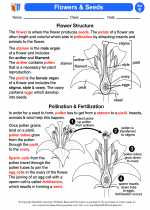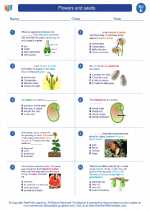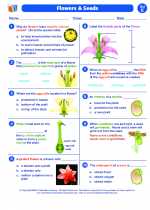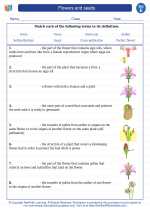Flowers and seeds -> appreciation
Appreciation
Appreciation can be understood as the recognition and enjoyment of the good qualities of someone or something. It involves valuing and understanding the worth of a person, object, or a concept. In the context of science, appreciation can be related to recognizing and understanding the beauty, complexity, and functionality of natural phenomena, organisms, or scientific principles.
Understanding Appreciation in Science
In the field of science, appreciation plays a crucial role in fostering curiosity, understanding, and respect for the natural world. It involves developing a deep admiration for the intricate processes and systems that govern the universe, from the microscopic level of cellular biology to the vastness of the cosmos.
Ways to Cultivate Appreciation in Science
- Observation: Encourage students to keenly observe natural phenomena, such as the behavior of plants, animals, or the patterns in the sky, and appreciate the details and patterns they observe.
- Experiments: Engage students in hands-on experiments that allow them to witness scientific principles in action, leading to a deeper appreciation for the underlying concepts.
- Field Trips: Organize field trips to natural habitats, museums, or science centers to provide students with firsthand experiences that can spark appreciation for the diversity and complexity of life and the natural world.
- Discussion: Encourage open discussions about the beauty and functionality of natural phenomena, and guide students to appreciate the interconnectedness of various scientific concepts.
Study Guide for Appreciation in Science
Here are some key points to consider when studying appreciation in the context of science:
- Definition: Understand the concept of appreciation as it relates to the natural world and scientific phenomena.
- Examples: Identify and analyze specific examples where appreciation is relevant in science, such as the beauty of a microscopic organism or the elegance of a scientific theory.
- Importance: Recognize the significance of appreciation in developing a holistic understanding of science and fostering a sense of wonder and curiosity.
- Application: Explore how appreciation can influence scientific inquiry, innovation, and ethical considerations in scientific research and exploration.
- Reflection: Reflect on personal experiences of appreciating natural phenomena and consider how such experiences have contributed to a deeper understanding of science.
By cultivating appreciation for the natural world and scientific principles, individuals can develop a deeper connection with the wonders of the universe and gain a profound understanding of the intricate mechanisms that govern our existence.
.◂Science Worksheets and Study Guides Fifth Grade. Flowers and seeds

 Activity Lesson
Activity Lesson
 Worksheet/Answer key
Worksheet/Answer key
 Worksheet/Answer key
Worksheet/Answer key
 Worksheet/Answer key
Worksheet/Answer key
 Worksheet/Answer key
Worksheet/Answer key
 Vocabulary/Answer key
Vocabulary/Answer key
 Vocabulary/Answer key
Vocabulary/Answer key
